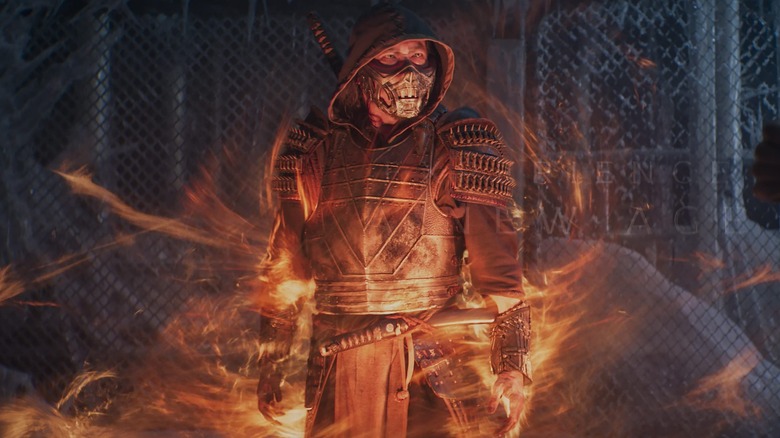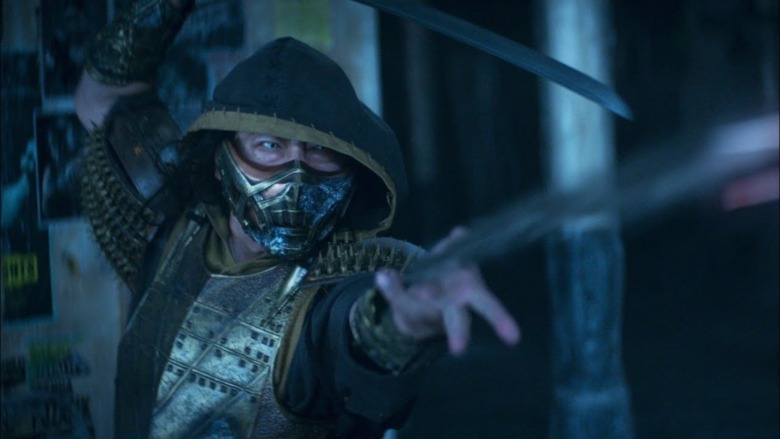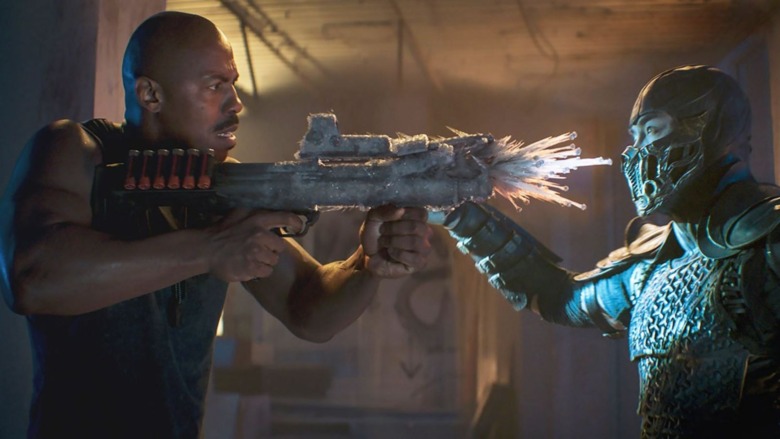Mortal Kombat Review: A Victory... With Plenty Of Flaws
For many years, video game-to-movie adaptations were regarded as among the worst genres in film, to the extent that each time a director signed on to make one, their press interviews often quoted them saying they aimed to make the first good one. In the 2010s, we even had a brief wave of arthouse filmmakers attempting to reimagine video game challenges as more than just potential big screen blockbusters — and their attempts to have this material taken seriously, while simultaneously trying to please the fans by delving into complex lore, naturally fell flat. Films like Duncan Jones' "Warcraft" and Justin Kurzel's "Assassin's Creed" were noble failures, which seemed to forget why people played those games in the first place. They were so concerned with being the first "good" video game movie, they forgot to be fun in the process.
It's no surprise that, when faced with these forced attempts at making the first good video game movie, the original "Mortal Kombat" adaptation has been critically re-evaluated. Paul W.S Anderson's 1995 film is now celebrated for the reason critics initially wrote it off; it's knowingly cheesy, has impressive fight choreography, and respects the mythology of the game universe without leaving you feeling like you're watching a cut scene whenever the sparring ends. Fans can breathe a sigh of relief that the long-awaited big-screen reboot of the franchise also pulls off that tricky balance of taking this universe seriously without compromising on the inherent kitsch factor. It's far from a flawless victory, but it is a surprisingly fun time.
Remembers that video game movies should be fun
For those uninitiated with the "Mortal Kombat" universe, the narrative sounds more convoluted than it actually is. In the modern day, an ancient prophecy reveals that the blood of Hanzo Hasashi will help the Earth's realm defeat the ruling Outworld territory in the Mortal Kombat death match tournament. The champion fighters on Earth all share a distinctive dragon mark, so Shang Tsung (Chin Han) sends out fighters to kill them before they unite and take the crown. MMA fighter Cole Young (Lewis Tan) is the most prominent, and is soon attacked out of the blue by Sub-Zero (Joe Taslim). He's ordered to flee to safety and track down Sonya Blade (Jessica McNamee), who has been researching the existence of Mortal Kombat. With the help of mercenary Kano (Josh Lawson), they travel to the hidden temple of Lord Raiden (Tadanobu Asano), where they must train to defeat the Outworld warriors — and to do so, they must unlock the special powers that are hidden within all those who bear a dragon mark.
In practice, one of the major positives about this latest iteration of "Mortal Kombat" is how it doesn't wear the audience down with endless exposition. From the prologue set in 17th century Japan onwards, a needlessly convoluted mythology and its differing allegiances are efficiently explained through the fight scenes — the reason you chose to watch a new "Mortal Kombat" movie in the first place. Although not as groundbreaking as the 1995 adaptation, the first major Hollywood effort to be influenced by the Hong Kong wire-fu genre (did "Mortal Kombat" walk so "The Matrix" could run?), director Simon McQuoid does effectively deliver the R-rated violence fans of this series missed out on in the previous PG-13 movies. Look past the often laughable CG blood splatter and there is a winning simplicity to how the action is staged here, all unfolding in clean takes that aren't obscured by fast cutting — fights effectively framed like their video game counterparts, without feeling like you're watching your friend have a go with the PlayStation controller.
Outside the action, the rest of the film never feels like an endless cut scene, although its attempts to blend a sense of reimagined 1990's kitsch with tongue in cheek, borderline "21 Jump Street"-style attempts at breaking the fourth wall often fall flat. This isn't helped by the inclusion of Josh Lawson's Kano, who has to bear the weight of the film's worst attempts at broad humor — that Lawson manages to get as many laughs from this material as he does groans is testament to his brutish charisma, which makes him the most effective dramatic performer onscreen even as he has to bear the brunt of the script's worst one-liners. In another actor's hands, Kano would be absolutely insufferable, but Lawson convinces you that he's more than an annoying comic sidekick. To quote a recent Twitter meme, he truly understood the assignment. He certainly commits more than the other performers, who deliver winking lines about how (for example) the word "Kombat" is spelled wrong with a clear sigh.
Awkwardly tries to establish a franchise
The film's attempts to be funny are a mixed bag. Screenwriters Greg Russo and Dave Callaham often fall back on the lazy screenwriting crutch of having characters list easily recognizable pop culture references instead of saying jokes, hoping that laughs of recognition will paper over the lack of comic inspiration. In one scene, a shirtless character is greeted by Kano calling them Magic Mike; in another, a character wearing baggy pants is introduced with the moniker MC Hammer. The screenplay does a serviceable job of simplifying the mythology without minimizing it, to the extent the comic moments are a clear afterthought, something of a problem when the film frequently tries to revel in its own kitsch factor, right down to the contemporary remixes of the 1995 film's soundtrack. And if this iteration of "Mortal Kombat" does often feel like an R-rated movie squarely aimed at 12-year-old boys, the endless outdated pop culture gags often represent the sole half-hearted attempts at reminding the audience that this isn't a tween action movie with more excessive bloodshed.
"Mortal Kombat" does fall down at the final hurdle. In interviews, director Simon McQuoid has spoken at length about how this film wasn't designed to reintroduce a franchise, and instead aimed to make something that could be judged on its own merits. And for the most part, that's seen onscreen — right up until the climactic ten minutes, when the action abruptly ends, all to set up rematches and allude to fan favorite characters who may return in a potential sequel. Some have argued this ending makes "Mortal Kombat" nothing more than a feature-length trailer for the next film, and it's hard to disagree. Instead of raising anticipation levels for another bout of Kombat, it merely drains enthusiasm, a disappointing end to a film that, for all its faults, gives the audience exactly what they want.
Fans of "Mortal Kombat" can breathe a sigh of relief, as can any audiences looking for a large-scale blockbuster that doesn't take itself too seriously. It's a minor victory, not a flawless one.


